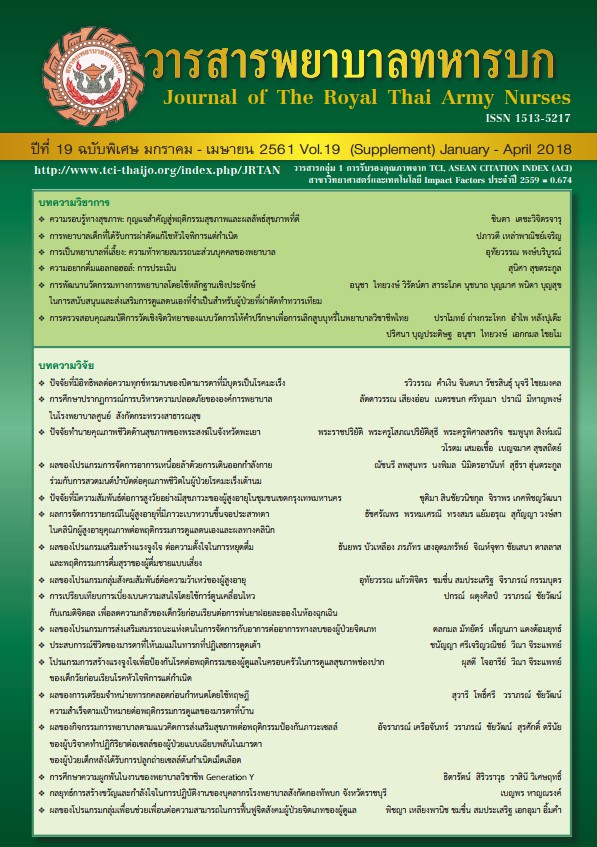Factors Influencing Suffering of Parents who had Children with Cancer
Keywords:
parents’ suffering, beliefs about illness, perception of child’s physical suffering, social support, spirituality, children with cancerAbstract
This research examined the effect of parents’ perceptions of a child’s physical suffering, parents’ beliefs about illness, social support and spirituality on parents’ own suffering. The sample was selected by a cluster random sampling technique. Participants included 231 parents of children with cancer from six regional hospitals in Thailand. Data were collected by using a demographic data record form and self-report questionnaires about the perceptions of a child’s physical suffering scale, Family Illness Beliefs Inventory, Social Support Questionnaire, Spiritual Well-Being Scale and Suffering Scale. Data were analyzed by using descriptive statistics and multiple regression. Results showed that the parents’ beliefs about illness and parents’ perceptions of their child’s physical suffering were significantly influence on the parents’ suffering (β = .38, p <.001 and β = .20, p <.001). These predictors combined could explain 23% of variance in parents’ suffering (R2 = .23, p < .001). Results indicated that the parents’ perception of child’s physical suffering and their beliefs about illness affected their own suffering. Nurses who care for children with cancer should be aware not only of their patients’ distress but also the suffering of the parents. They should develop quality of nursing interventions to reduce suffering and burden of parents in appropriate method.
Downloads
References
2. Creswell PD, Wisk LE, Litzelman K, Allchin AA, Witt WP. Parental depressive symptoms and childhood cancer: The importance of financial
difficulties. Support Care Cancer. 2014: 22(2); 503-511.
3. Rajajee S, Ezhilarasi S, Indumathi D. Psychosocial problems in families of children with cancer. Indian Journal of Pediatric. 2007: 73; 837-839.
4. Vélez MC, Palacio C, Moreno AI, Krikorian A. Psychological and family-related facts of suffering in patients with chronic diseases. Techniques in Regional Anesthesia and Pain Management. 2013: 17(1); 7-10.
5. Ferrell BR, Coyle N. The nature of suffering and the goals of nursing. Oncology nursing forum, 2008: 35(2); 241-247.
6. Seyama R, Kanda K. Suffering among the families of cancer patients: concept analysis. Kitakanto medicine journal. 2008; 58: 71-76.
7. Boerner K, Mock S. Impact of patient suffering on caregiver well-being: The case of amyotrophic lateral sclerosis patients and their caregivers. Psychology, Health, & Medicine. 2012: 17(4); 457-466.
8. Krikorian A, Limonero JT. An integrated view of suffering in palliative care. Journal of palliative car. 2012; 28(1): 41-49.
9. Wright LM. Spirituality and suffering the part of illness healing. Canada: 4th floor press, Inc; 2017.
10. Wright LM, Bell JM. Beliefs and illness a model for healing. Canada: 4th floor press, Inc; 2009.
11. Kazak AE, McClure KS, Alderfer MA, Hwang WT, Crump TA, Le LT, Deatrick J, Simms S, Rourke MT. Cancer-related parental beliefs: the
Family Illness Beliefs Inventory (FIBI). Journal of Pediatric Psychology. 2004: 29(7); 531-542.
12. Krikorian A, Limonero T, Mate J. Suffering and distress at the end of life. Psychology-Oncology. 2012: 21; 799-808.
13. Herbert RS, Arnold RM, Schulz R. Improving well-being in caregivers of terminally ill patients. Making the case for patient suffering as a focus for intervention research. Journal of Pain and Symptom Management, 2007: 34; 539-546.
14. Steinhauser KE, Voils CL, Clipp EC, Bossworth HB, Christakis NA, Tulsky JA. “Are you at peace?”: one item to probe spiritual concerns at the
end of life. Arch Intern Med, 2006: 166(1); 101-105.
15. Wright LM, Leahey M. Nurses and families. A guide to assessment and intervention. 6thed. Philadelphia: F.A. Davis; 2013.
16. Hickman SE, Tilden VP, Tolle SW. Family perceptions of worry, symptoms, and suffering in the dying. Journal of Palliative Care. 2004: 20(1); 20-27.
17. Canadian institute for health information. The Role of Social Support in Reducing Psychological Distress. 2012.
18. Schulz R, Monin JK, Czaja SJ, Lingler JH, Beach SR, Martire LM, et al. Measuring the experience and perception of suffering. Gerontologist. 2010: 50(6); 774-84.
19. Schaefer C, Coyne JC, Lazarus RS. The health-related functions of social support. Journal of Behavioral Medicine, 1981: 4; 381-406.
20. Hanucharurnkul S. Social support, self-care, and quality of life in cancer patients receiving radiotherapy in Thailand. 1988: Unpublished doctoral dissertation, Wayne State University. 21. Paloutzian RF, Ellison CW. Loneliness, Spiritual well-being and quality of life. Journal of Psychology and Theology, 1982: 11(4); 330-340.
22. Get-Kong S. Symptom experience, palliative care, and spiritual well-being in patients with advanced cancer. (Doctoral dissertation). Mahidol University: Thailand; 2009.
23. Wiwatkamonchai A, Kantawang S, Mesukko J. Chronic Sorrow and Management Strategies Among Parents of Children with Cancer
Receiving Chemotherapy. Journal of The Royal Thai Army Nurses, 2017: 44(1); 62-73. (in Thai)
24. Sarakshetrin A, Ratchatarom B, Chantra R, Kallaka S. Nursing Interventions for Relief Pain in Cancer Patients: Meta-Analysis. Journal of The Royal Thai Army Nurses, 2017: 15(2); 203 -209. (in Thai)
25. Monin JK, Schulz R. Interpersonal effects of suffering in order adult caregiving relationships. Psychology and Aging. 2009: 24; 681-695.
26. Rosenberg AR, Dussel V, Kang T, Geyer JR, Gerhardt C, Feudtner C, Wolfe J. Psychological distress in parents of children with advanced cancer.
The Journal of the American Medical Association Pediatrics. 2013: 167(6); 537-543.
27. Supsung A, Khunkaew S, Udomlerd M. Managing fear needle pain in children : nursing practice in pediatric care. Journal of The Royal Thai
Army Nurses, 2017: 18; 25-31. (in Thai)
28. Wacharasin C, Khamngoen R, Rattanamanee K, Chivanon N. Suffering among parents having children with leukemia. Journal of Nursing and
Health Care. 2017: 35(3); 78-88. (in Thai)
Downloads
Published
How to Cite
Issue
Section
License
บทความหรือข้อคิดเห็นใดใดที่ปรากฏในวารสารพยาบาลทหารบกเป็นวรรณกรรมของผู้เขียน ซึ่งบรรณาธิการหรือสมาคมพยาบาลทหารบก ไม่จำเป็นต้องเห็นด้วย
บทความที่ได้รับการตีพิมพ์เป็นลิขสิทธิ์ของวารสารพยาบาลทหารบก
The ideas and opinions expressed in the Journal of The Royal Thai Army Nurses are those of the authors and not necessarily those
of the editor or Royal Thai Army Nurses Association.






